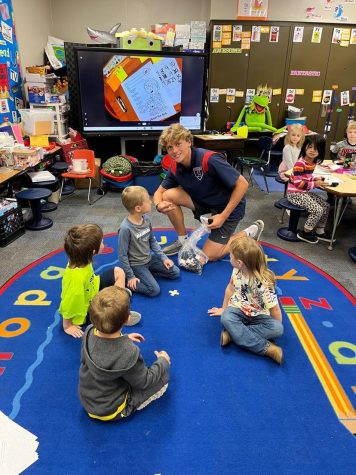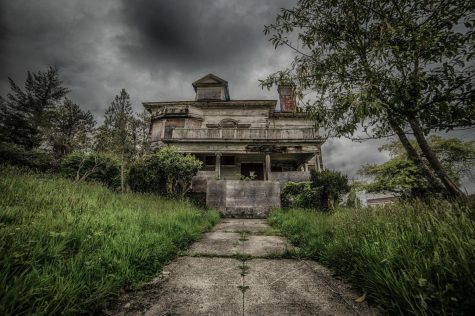Daisy Carter is Dead
Twins wasn’t the right term. No, the word “twins” conjures images of cutesy little girls, matching dresses and bobby socks slipping down ankles, hand in hand, pigtailed and precious. Twins were mirror images, small distortions making all the difference, forming separate people from one lump of clay. Each smaller than a whole, some parts missing, a jigsaw split into two boxes. No one would ever see the full picture if they were apart. Equal but never separate, twins were a single image. Twins were something from fairytales, make believe. Two people who looked like one, a curse, some witch’s evil spell. Twins were something magic.
But the Carter girls, no, they weren’t twins. Even saying it now, twins, TWIH-NS, doesn’t feel as it should. They were a unit, a singularity, a strange sort of tear in the fabric of the universe ending with two girls in one spot, one or the other always flickering in and out of view. Rapid and quick, strobing, so they appeared as one. Never together, never apart.
In life, they were haunting, bringing with them a feeling of discomfort wherever they went. No one could ever place their finger on the reason as to why. Like when dogs bark at nothing, all the hair stiff on the back of their neck, no one ever being sure what caused the reaction, just knowing that to the dog, something wasn’t right. The residents felt it strange, being the dog.
But what remained of the Carter girls, rather, what the residents of Faith Street chose to let live, was their visage. In particular, a picture, the pair of them smiling at the camera. A coy smile, one with mischief drawing at the corners of mouths and the corners of eyes, everyone on the street had seen the photo. Hell, they probably had their own copy, cut out with shaky scissors from the local newspaper. The print around the image faded, the paper yellowed, squeezed in between the pages of family photo albums, as if those girls belonged to them, so they could point them out later, show some aunt from a state over the newest additions to the book and “stumble” upon the clipping. “Those Carter girls, a shame, a shame. I knew them…”
They’d always been a cute. But, most kids, even those in less… fortunate situations, have some of that cherubic, chubby-cheeked appeal that parents love pointing out to their friends. But they grew to be more than generic, laundry detergent commercial cute, so to say gap-toothed and big-eyed, but utterly unmemorable. By the time the Carter girls were old enough, for what no one ever knew, but enough, they were a looker.
They had a face that could stop traffic, or so their mother said, (but really, when are mothers’ truly reputable sources on these matters). Eyes the color of the clouds after rain, an odd, in between sort of color, lips pulled from those old glamour ads, they had a face for the magazines, said their father, begrudgingly (but fathers’ are only slightly more reputable than mothers’ in regards to appearances). With obscene breasts that led the way for vulgar hips that curved to long indecent legs, they were Venus, rising up from an inflatable kiddie pool. They were Marilyn, decked in ragged cut off shorts. They were Cleopatra, sitting on a lawn chair throne with a chain-link kingdom.
They moved in sync to a song no one ever heard, with hips that swayed on the border of PG13, moved with a purpose no one ever knew.
No one was sure where it all had come from, that walk, that face. Not from their mother certainly, her beauty was faded, distilled, subdued by her surroundings, her movements quick, a hard foot on the pavement with each step. Nor could it have come from their grandmother, two houses down. A plump woman, doughy, who jiggled when she laughed, her edges long since having softened from years of children and grandchildren. Not even from their older sister, a dim bulb to their flame, only jealousy letting her burn at even that rate, or their cousins (two streets over where the word “sketchy” was very rarely thrown about), waifish girls with spindle arms and drinking straw legs, (from the French in them, her mother would always say, shaking her head, those damn French genes, feed those girls some steaks, get some meat on their bones).
No, their walk was all their own and everyone knew. A shared secret between them, invite only, password required. And when they would walk down the street, head thrown back as they laughed at a joke, eyes crinkled up, people would stare. In time, most had the common decency to avert their eyes. It seemed almost too personal, too private for the eyes of mere neighbors, as if that walk was for themselves alone, and everyone knew that it was not meant, nor would ever be, for them. But those neighborhood boys, too enamored for tact, too wanting for manners, they would watch in rapt awe.
Yet was no one watching that day? Was no one failing to turn their eyes from the sway of the Carter girls? Questions meant never to be answered, no one would ever know the truth, and that itself was a truth swallowed like an unpleasant pill.
That day would never be remembered as anything but tragic, for the rest of the time Faith Street existed as it did, that day would be black. Stained. Marred. A slash on the calendar. Bloody.
–
Heat, suffocating heat, hell had nothing on that indian summer. That summer had been one of those tires-melting on the pavement type of summers. Lazy days spent on sun-scorched grass with slippery glasses of watered lemonade in hand, the heat bore down on the residents of Faith Street without compassion. Clunky air conditioners pumped damp air into the small homes with wheezing breaths. A multitude of plastic tassels tied to the vents, they fluttered violently in a rainbow of colors. The sun reflected off warped plastic windows, bleached the towels left to hang on rickety porches. When August began fading into September, summer was nowhere near its close.
The day had been unordinary but unplaceable as to why, one of those few strange once-in-a-lifetime days, where everything feels right and strange and perfectly out of place; that was the day when things came crumbling to the earth. A corn pollen haze coated the sky and the faint hum of big green machinery could be heard, a constant drone in the background. A juxtaposition between seasons, dead corn and overflowing blow-up pools, the pushing of pumpkins at the local convenience store and the little polka dot bikini tops and cutoff shorts worn by the neighborhood girls, Faith Street was a conundrum that day.
A Wednesday, an unspectacular day by all accounts. Wednesday. Even rolling off the tongue, clunky, burdensome. Wed. Nes. Day. What other day could it have been? School had yet to start for the year and sticky faced children played on lawns without so much as a care, or rather, adult supervision. Those days, no one needed to look twice, step carefully, move in pairs, two by two, heading to an Ark. If someone had suggested it, the idea would have been met with laughter. Faith Street was not the place to worry, especially not when the sunshine pulled restless teenagers from rattled parents’ hair.
Their means of escape, the Carter girls’, was a bike. Ruby red and rusted, childish streamers attached to the spokes of the wheels. It was a warning, whenever anyone heard that clack, clack, clack of the plastic lashing against the metal, they would know that the Carter girls were coming. That noise was as recognizable as their face, and the residents of Faith Street would later admit, years down the line, that noise brought them back to that sunscorched street on a lazy September day. The bike had been a gift, their mother told everyone, warbled, watered voice- as close as she ever came to tears- for a twelfth birthday. It had been Rosie who had wanted it. Or had it been Daisy. Even she could not tell her daughters apart. When once asked who had been born first, she had frowned, an answer never coming. (No one had asked her again.)
The bike carried them both, for as long as anyone could remember and each summer was marked by the Carter girls taking their first ride of the season. By the end of what felt like an era to everyone on the street, the bike was a sad sort of thing, falling apart and tetanus riddled. Yet, somehow, by magic maybe, that twin magic, they made that Schwinn a Rolls Royce when they peddled down the sidewalk.
Each summer day opened with the Carter girls zipping past the rundown row of houses at breakneck speeds. They would stop at the corner store, just a few blocks over, buy sodas, and sit out front on the curb, mouth of the bottle flush against their lips. They’d done the same that day, that Wednesday.
A few of the local boys came around, watching them with a hunger, staring as one would at a piece of unexplainable art. The girls were one, sipping grape soda in sync as they sat in silence, not needing words to speak. Occasionally, they would laugh, throw their head back, a flash of white before glass clanked teeth. In a rare few minutes, only one stood up, going inside with an empty bottle in her hand to buy another. It had been Rosie, the group of boys would later say, Rosie had gotten up. Or had it been Daisy? One of the boys, the braver of the bunch, made his way to talk to her, the strange one half left alone for a mere heartbeat of an instant.
He never could recall what they spoke about, what he said, why her brows arched up, why her nose scrunched, lips parted in a hint of a laugh. He could never say, no matter how oft he was asked, the brief conversation was something fleeting, caught in the wind. It had blown away before he knew to keep it.
No one knew much about the Carter girls, someone could talk with them for hours and leave knowing nothing more than what they started. That boy with the gall to try and learn, he ended no better than anyone else who had tried. They didn’t need anyone else, just themselves.
When Rosie (or had it been Daisy?) moved to sit back down next to her other half, their hands brushing, knees pressed side by side, a sort of barrier came into place. The freeze out, that’s what people called it, everyone around suddenly didn’t exist. They lived in their own world, their own bubble.
The boy, his name one of many jumbled about when it came to that day, shuffled off, tail between his legs, leaving the girls with their grape soda and sticky lips. The sun moved lazily across the sky, dragging through milky clouds, the time passing in the type of blur that only summer knows. The lone worker in the corner store was never able to say how long they were there, sitting out on the curb with their long legs tangled and sprawled. Despite the languid, lazy ease of which the Carter girls exhibited on the curb, sometime before dusk they had moved on from the corner store, mounting their rickety bike and pedalling away.
What they did next…people say differently. “Saw them at the park, swingin’ side by side, holding on to each other.” “They were down by the Stout place, sitting on the back porch with a couple of cigarettes.” “I watched them bike down towards the railroad tracks around supper time.” “Saw them with their sister, Ann.” They could have done none of it or they could have done it all, swung in the park, smoked a pack, peddled to the tracks, run into Ann. But whatever it was they did, no one ever saw them again as they were. Those boys, that woman in the corner store, in their minds they held the last glimpse of the Carter girls’, bright and shiny with youth and their strange twin magic.
Everything everyone on Faith Street knew about what had happened afterwards came from the police. Their presence on Faith Street was nothing uncommon, domestic spats, “dates” gone wrong, drunk and disorderlies; it was far from the Waldorf-Astoria, the street lined with rundown mobile homes on their cement foundations. But when the black and whites pulled in, circled the roundabout, something in the siren wail was more than ominous. It shrieked like a banshee, a blood curdling cry that sent warning bells off in the heads of the residents. This was more than just a publicized marital spat, an inebriated square off.
A few hours had passed and the sun and disappeared, swallowed whole by the horizon by the time they found her. Just her. She moved from the woods- the ones that sat just down from the tracks, the line of trees with the shoe sucking mud- like a woman dead. Lady Macbeth with her candlestick, a marionette with crumpled legs, she seemed to move without awareness of herself, her surroundings, the police officer holding her upright by her arm. No one noticed the blood, the hollow look frozen in her eyes, the way her lips moved without so much as a sound spilling forth.
What they noticed was the fact she was alone. As if she was missing half her body, innards grotesque and dangled, her other half was simply gone. Poof, a magic trick gone wrong, that twin magic backfiring on the pair of them. The one girl left. Looking at her felt wrong, as if she was naked, exposed, a half there image not ready to be seen.
Rumors swirled of course, even after the official police report had been issued and discussed at length. What had happened behind the thicket? What had happened to them when no one was around to watch? Those poor girls, those poor Carter girls. Even in solitude, Rosie (was it Rosie?) was them. The police officers badgered her, as much as one could badger a statue, a block of stone, umoving and unchanging. They asked question after question after question. Had it been a stranger, someone they knew, an accident, on purpose, where was the weapon, what was the weapon, how had it happened, why had it happened. By the end of the night, the officers had only gotten one thing from the girl.
“We knew something wasn’t right…” Nothing more, nothing less. Even she knew that they would always be we. Rosie spoke slowly, trying to find the words to say, infantile in her efforts. Her single statement dragged, tapered off as if there was much left to say. But no one was there to finish her sentence.
An odd sort of fill in the blank, everyone tried to guess to no avail what it was the dead Daisy Carter would have said. What hadn’t been right? What had those girls known? What had their twin magic told them?
–
It only took a week before Rosie Carter joined her sister in the ground, two fresh graves, side by side. Only a single tombstone had been bought.
Even in death, they were one.
(I don’t mind negative criticism, so have at it)






Shad Sparks • Jan 31, 2016 at 8:05 pm
I really saw this taking place in the ’60s or ’70s, just the feel to the story of being out on a hot summer day in a small neighborhood of side-by-side houses while drinking lemonade and kids running around. My interpretation of a “yellow sundress” kind of concept that makes me think of this time period for some reason. The introduction of the story was insane, with the whole mind-bending idea about twins and the suspense and build up of this horrific event and a great story all round. Good job!
Ashton McClain • Jan 25, 2016 at 1:06 pm
You do such an amazing job with your writing and if you don’t pursue a career in it I will be heartbroken! You use words that paint a picture perfectly in my mind. The dark setting and/or tone you used set the mood for the entire story. I couldn’t stop reading as I began to speculate what happened to the twins! The ending was so eery yet insightful on how you concluded they were still one, even in death. This was such an amazing story from start to finish and I would love to read more of your writing! Great job!!
Cyan Rhine • Jan 25, 2016 at 8:42 am
Well gosh, Jodi, I’m so amazed… and maybe a tad jealous. The whole story felt very alive and real to me, from the days of summer and the clinking bottles of soda to the recollection of the twins by the town years later, yellowed newspaper clippings and all. You used a multitude of different strategies to make the story pop but as usual, your imagery was my favorite. From the first drafts of the story I was enraptured by the strange twins and after reading it for the second time I’m still filled with a sense of curiosity. Open-ended things can sometimes bother me because of the difficulty executing it properly (I’ve seen my share that seemed like a last-minute cop-out), but I definitely enjoyed the ending to this, twist and all. The only frustrating part was I wished Rosie hadn’t passed away a week later… but at the same time I can’t imagine her living without her other half.
Peyton Shafer • Jan 25, 2016 at 8:07 am
I absolutely loved this story! The imagery you used to describe the twins was awesome. I loved the suspense you created that lead up to the ending and how the reader didn’t end up finding out what happened to the twins and it was left up to our own imagination. Great job!
Morgan Craw • Jan 15, 2016 at 1:28 pm
I agree with Tristan- I imagined this story as an old black and white movie. I have never read another story with better descriptive words than yours; you always do such an amazing job of creating a perfect image for the reader. I loved the feeling of darkness and suspense as I waited to see what happened to the twins that Wednesday, and I enjoyed the open ending. I like that you set it up so anyone can determine their own ending. Amazing job.
Tristan Claypool • Jan 5, 2016 at 2:57 pm
As a brother of twins, I can say that twins are different. Not often does one see a unit of two different, yet the same people. The story invokes an emotional response as I ponder the effect of losing the other half of the pair. The author captures the odd type of bond present in a set of identical twins. Furthermore, the word choice and overall feel of the story reminds one of an old black and white detective movie and sets the scene perfectly.
Hazel Coffin • Dec 13, 2015 at 7:49 pm
WOW!!